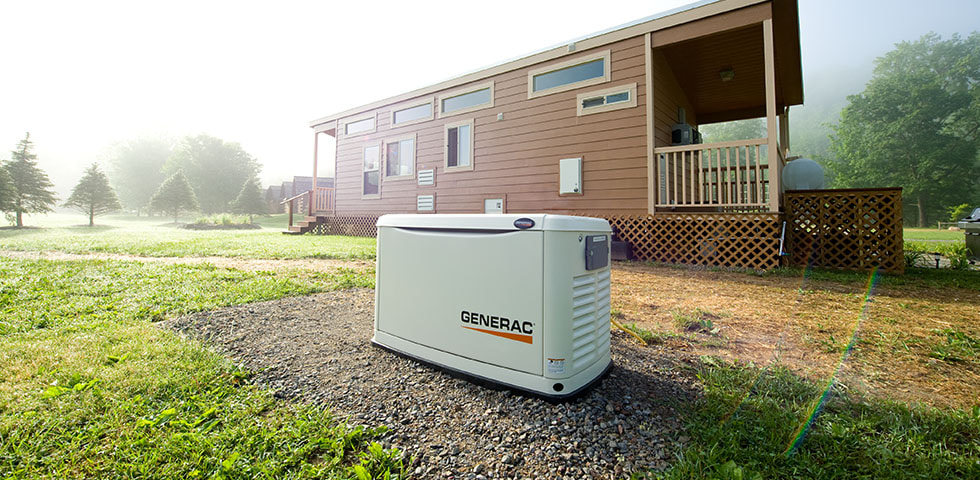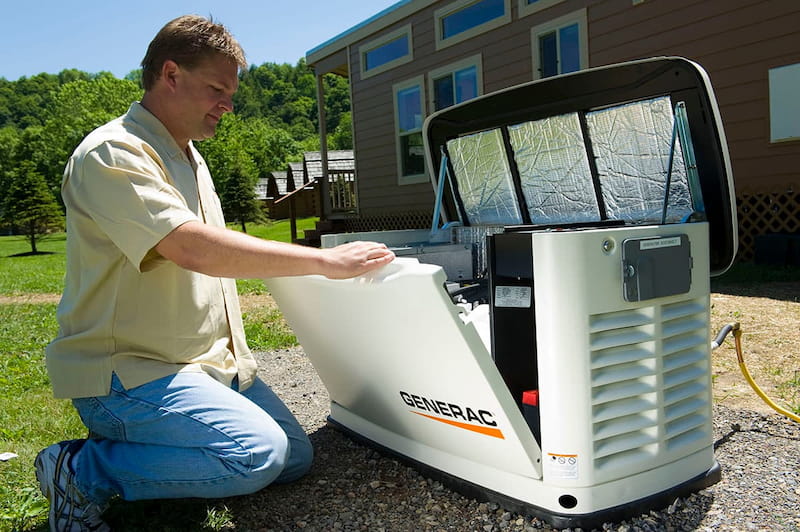
A reliable propane standby generator is a key part of resilient design. When the power is knocked out, standby power keeps heating and cooling, lighting, refrigeration and other critical building amenities in operation for your clients.
Until recently, home and business owners who wanted reliable power — even during planned or unplanned blackouts — had to choose a few select applications that would remain running during a power disruption. For example, freezers or heat could keep running, but everything else had to be shut down. Today, however, improvements in generator load-monitoring technology have made it possible to keep power flowing throughout a home or business, even as demand surges and shifts. Now, if a generator gets to the point of overloading, it can automatically shut off non-essential appliances and bring them back on when demand subsides.
“If you had asked me four years ago, I would say we were doing mostly partial-house installations,” says Bob Camper, owner of AllInstall LLC, a Virginia-based installer of Generac standby generators. “We’d put in a subpanel with critical systems wired into the panel: heat, water pump and refrigerator. Now, every machine we install can do load monitoring.”
“These generators have a load monitoring switch with four levels of priority,” Camper explains. “If a generator overloads, it immediately will drop off the four biggest electric draws, then reapply them one at a time to make sure it doesn’t overload. For example, a 20-kW generator, which normally puts out 82 amps, can bump to as much as 125 amps to start an air conditioner, although it can’t sustain that. If more than 80 amps are drawn for more than three seconds, then we’ll automatically drop what we’ve selected to protect the generator.” Likewise, these propane generator features make it easier for buildings to achieve more comprehensive protection without having to go through the fuel storage, maintenance, reliability, and emissions challenges of diesel-fueled generators. “On Thanksgiving, an electric stove with all four burners and oven on will pull half the capacity of a 20-kW generator just by itself,” says generator installer Bob Camper. “In my own house, I’m going from electric to a propane gas cook stove.”
Complementary Propane Systems
Builders and remodelers can also combine a propane generator with a suite of propane appliances to provide residential and commercial clients with whole building standby protection at an affordable price. When critical systems such as space heating and water heating are fueled by propane, the standby generator can typically be downsized — and made more affordable — because it isn’t running power-hungry electrical heating appliances.
Customers can save as much as $2,000 on the generator, according to Dave Dawson, CEO of Smart Homes of Virginia, a generator installer based in Charlottesville. “On a typical electric indoor air-handler, the emergency heat strips will take as much as 10 kW or even more if the emergency heat kicks on,” Dawson says. “So it takes a big generator — or they have to do without that heat or risk shutting the generator down.”
Alternatively, if the furnace runs on propane, it uses minimal electrical power, he explains. “Not only does the heat come on when they want, but also instead of a 20-kW [generator], they might get away with a 14-kW, which will allow them to save $1,500, even $2,000 or more on a generator.”

Bundling for Savings
As installers do the energy-consumption audit needed to properly size a generator and pipe the house for propane, remodelers can offer homeowners the opportunity to convert other major systems to propane or natural gas to maximize energy efficiency and cost savings.
“It does make a big difference if they have at least one or two propane gas appliances,” Camper says. “Because we’re going to be doing a gas line to get the propane to the generator, it’s an ideal time to upgrade heating, water heating, and cooking appliances. I’m encouraging people to switch to gas, to put in a gas heater, a gas tankless water heater in lieu of a water tank, and a gas cook stove.” Most of Camper’s customers live in rural areas and use propane to fuel their generators. “About half our customers have buried tanks or will have us do so when we do the generator installation,” he says. Both installers stress the importance of having a certified professional size and put in a whole-house generator because of the computerized load monitoring system that comes built into the switch. “If you overload generators, you can easily burn them out, and then you are talking a couple of thousand dollars to fix them,” Camper says.
Propane Partners
By choosing propane for these building systems, you can reduce the load on the generator, and possibly even spec a smaller, more affordable generator. Most propane appliances require backup power only for the electronic ignition, if at all.
Space Heating
Propane forced-air furnaces provide airflow up to 25 degrees warmer than the average electric heat pump and typically last twice as long.
Water Heating
Condensing tankless water heaters can provide energy savings up to 40 percent over conventional electric water heating systems, while providing endless hot water delivery.
Fireplaces
A propane fireplace provides more than ambiance, it’s an ideal secondary heat source that’s much cleaner and more efficient than a wood-burning fireplace.
Cooking
Eating out every night of an outage can add up financially, and who wants to go out in a storm anyway? Propane cooking appliances won’t strain your generator’s capacity.
Clothes Drying
For hotels and other buildings with laundry facilities, propane dryers keep the fresh linens coming in a power outage.
A Differentiator for Building Pros
By choosing propane, builders are literally empowering customers and building authority as a trusted partner. To get more guidance and advice from other pros designing cutting-edge solutions, download The Ultimate Guide to Power Generation at propane.com/powergeneration. This free e-book will show you how to make the most of the new generator technologies and products available on the market and incorporate them into your business, including applications that combine propane with renewable resources like solar power and waste heat — both on and off the grid.
Click here for more information on propane power generation.


